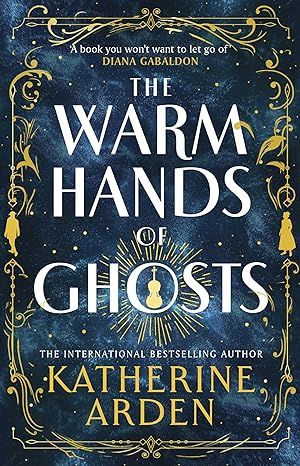The Warm Hands of Ghosts
4.3
-
1,167 ratings
NATIONAL BESTSELLER • During the Great War, a combat nurse searches for her brother, believed dead in the trenches despite eerie signs that suggest otherwise, in this hauntingly beautiful historical novel with a speculative twist, from the author of The Bear and the Nightingale.
“A wonderful clash of fire and ice—a book you won’t want to let go of.”—Diana Gabaldon, author of Outlander
“Spectacular—a tour de force, wonderful and deep and haunting.”—Naomi Novik, author of A Deadly Education
January 1918. Laura Iven was a revered field nurse until she was wounded and discharged from the medical corps, leaving behind a brother still fighting in Flanders. Now home in Halifax, Canada, Laura receives word of Freddie’s death in combat, along with his personal effects—but something doesn’t make sense. Determined to uncover the truth, Laura returns to Belgium as a volunteer at a private hospital, where she soon hears whispers about haunted trenches and a strange hotelier whose wine gives soldiers the gift of oblivion. Could Freddie have escaped the battlefield, only to fall prey to something—or someone—else?
November 1917. Freddie Iven awakens after an explosion to find himself trapped in an overturned pillbox with a wounded enemy soldier, a German by the name of Hans Winter. Against all odds, the two form an alliance and succeed in clawing their way out. Unable to bear the thought of returning to the killing fields, especially on opposite sides, they take refuge with a mysterious man who seems to have the power to make the hellscape of the trenches disappear.
As shells rain down on Flanders and ghosts move among those yet living, Laura’s and Freddie’s deepest traumas are reawakened. Now they must decide whether their world is worth salvaging—or better left behind entirely.
Read more
Kindle
$13.99
Available instantly
Audiobook
$0.00
with membership trial
Hardcover
$17.60
Paperback
$17.08
Ships from
Amazon.com
Payment
Secure transaction
ISBN-10
1529920043
ISBN-13
978-1529920048
Print length
379 pages
Language
English
Publisher
Century
Publication date
March 04, 2024
Dimensions
6.02 x 1.14 x 9.21 inches
Item weight
1.07 pounds
Popular Highlights in this book
Armageddon was a fire in the harbor, a box delivered on a cold day. It wasn’t one great tragedy, but ten million tiny ones, and everyone faced theirs alone.
Highlighted by 219 Kindle readers
We won, screamed the people outside. Don’t they know, Laura thought, we all lost?
Highlighted by 116 Kindle readers
I suppose that is another piece of advice for you, Laura. Do not despair. Endings—they are beginnings too.
Highlighted by 109 Kindle readers
Product details
ASIN :
B0C56RBPSW
File size :
11762 KB
Text-to-speech :
Enabled
Screen reader :
Supported
Enhanced typesetting :
Enabled
X-Ray :
Not Enabled
Word wise :
Enabled
Editorial reviews
“A spectacular tour de force by one of my favorite authors, so wonderful and deep and haunting that you might well imagine it required a Faustian bargain of its own—I love this book so much and want everyone to read it!”—Naomi Novik, author of A Deadly Education
“Katherine Arden’s effortless blend of history and folklore is sure to entrance again with this stunning foray into the twentieth century, where ghosts walk, dreams blunt trauma, and myth becomes real.”—Kate Quinn, author of The Diamond Eye
“Darkly beautiful and deeply humane, this is a story of love that reaches across borders and across oceans, and even penetrates the veil of death. It will stir your heart and settle into your bones.”—Ava Reid, author of A Study in Drowning
“The Warm Hands of Ghosts is a miraculously warm fusion of the mud and bloody horror of war with the unquenchable power of love and the bond formed at the limits of human endurance. It’s a magical and marvelous book.”—Nicola Griffith, author of Menewood
“Absolutely incredible—I had chills all through reading it.”—Shannon Chakraborty, author of The City of Brass
“Katherine Arden isn’t writing about World War I, she’s writing from World War I—the diction, the madness, the desperation. But the hope, too—and maybe even a devil grinning at us from the trenches.”—Stephen Graham Jones, author of The Only Good Indians
“From the brutal trenches of World War I comes a vivid story of grief and love that feels not only timeless, but timely. This exquisite novel took me over like a haunting, and Arden’s eerie, exacting prose followed me long after I closed the cover. It’s one of the best historical fantasies I’ve ever read.”—Emma Törzs
“A marvelous novel, visionary, imaginative, and brilliantly written.”—Anthony Horowitz, author of Magpie Murders
“Arden’s haunting novel is at once immersive and timeless, an ode to the enduring power of memory.”—Vaishnavi Patel, author of Kaikeyi
“A page-turner of the highest order . . . a masterpiece of historical realism seamlessly blended with the supernatural that delivers spine-tingling heroism as well as a searing study of war’s cruelties and the necessity of remembrance . . . a haunting, fantastic read!”—Helene Wecker, author of The Golem and the Jinni
“Arden’s World War I setting is visceral, with real-world horrors that make warm-handed ghosts and seductive devils comforting in comparison. The touch of fantasy enhances the uncanny, shifting realities of a world in turmoil.”—Library Journal (starred review)
“Through resonant prose, [Arden] literalizes the apocalyptic qualities of WWI while dwelling in moral complexity and delivering vibrant, fully fleshed-out characters. The interwoven supernatural elements lend the historical details greater weight. The result is a powerful page-turner.”—Publishers Weekly (starred review)
“Set on and off the battlefields of Belgium in the final year of World War I, this novel adds a supernatural touch to its vividly realized historical details.”—Kirkus Reviews (starred review)
Read more
Sample
The Beast from the Sea
Halifax, Nova Scotia, Canadian Maritimes
January 1918
Freddie’s clothes came to Veith Street instead of Blackthorn House, and the telegram that ought to have preceded them didn’t reach Laura at all. She wasn’t surprised. Nothing had worked properly, not since December.
December 6, to be exact. In the morning. When the Mont Blanc had steamed into Halifax Harbor, oil on deck and high explosive in her hold. She’d struck a freighter, they said, and the oil caught fire. Harbor crews were trying to put it out when the flames found the nitroglycerine.
At least that was how rumor had it. “No, I don’t doubt it’s true,” Laura told her patients when they asked, as though she would know. As if, after three years as a combat nurse, she’d learned about high explosive from the things it wrote on people’s skin. “Didn’t you see the fireball?”
They all had. Her father had been in one of the boats trying to drown the blaze. Halifax afterward looked as if God had raised a giant burning boot and stamped. Fresh graves in Fairview sat snug beside five-year-old headstones from the Titanic, and the village of the Mi’kmaq had vanished.
And the post was a disaster. That was why she’d not heard from Freddie. He was her brother, he was a soldier; of course a backlog of his letters was lost in a sack somewhere. She had no time to think of it. She had too much to do. The first makeshift hospital had been scraped together in a YMCA the day after the explosion. The snow was bucketing down and Halifax was still on fire. Laura had walked past the uncollected dead. Shut their eyes when she could reach them, laid a hand once on a small bare foot. Three years of active service, and she was familiar with the dead.
Familiar too with the sight of an overrun triage station, although it was her first time to be met not with soldiers, but with parents clutching their burnt children. Laura had taken off her coat, washed her hands, reassured the nearest wild-eyed mother. Had a word with the overwhelmed civilian doctor and set about organizing the chaos.
That was a month ago—or was it six weeks? Time had stretched, as it did when wounded poured in during a battle, reduced not to minutes or hours, but to the pulse and the breath of whoever was under her hands. She slept standing up, and told herself that she was too busy to wonder why Freddie didn’t write.
“That damned virago,” muttered one doctor, half-annoyed, half-admiring. The Barrington hospital was full of willing hands. The Americans, blessedly, had piled a train full of all the gauze, disinfectants, and surgeons in Boston and sent it north. It was January by then, with snowdrifts head-high outside. The gymnasium had been turned into a hospital ward, sensibly laid out, ruthlessly organized, competently staffed. Laura was doing rounds, bent over a bed.
“That harpy,” agreed his fellow. “But she’s forgotten more about dressings than you’ll ever know. She was in the Nursing Corps, you know. Caught a shell over in France somewhere.”
It was Belgium, actually.
“Caught a shell? A nurse, really? What did she do? Dress as a man and creep up the line?”
The first doctor didn’t take the bait. “No—I heard they shelled the forward hospitals.”
A startled pause. Then— “Barbaric,” said the second doctor weakly. Laura kept on taking temperatures. Both doctors stopped talking, perhaps contemplating trying to practice medicine under fire.
“Lord,” the second doctor said finally. “Think all the girls who went to war will come back like that? Cut up, incorrigible?”
A laugh and a shudder. “Christ, I hope not.”
Laura straightened up, smiling, and they both blanched. “Doctor,” she said, and felt the subterranean amusement in her watching patients. She was one of them, after all, born by the harbor, before the world caught fire.
The doctors stammered something; she turned away again. Virago indeed. A fanged wind was tearing white foam off the bay, and her next patient was a blistered little boy. The child wept as she peeled off his dressings.
“Hush,” said Laura. “It’ll only hurt for a moment, and if you’re crying how can I tell you about the purple horse?”
The little boy scowled at her through his tears. “Horses aren’t purple.”
“There was one.” Laura snipped away stained gauze. “I saw it with my own eyes. In France. Naturally, the horse didn’t start out purple. It was white. A beautiful white horse that belonged to a doctor. But the doctor was afraid that someone would see his white horse on a dark night and shoot him. Turn that way. He wanted a horse that would be hard to see at night. So he went to a witch—”
A lurch. “There aren’t witches in France!”
“Of course there are. Be still. Don’t you remember your fairy tales?” Freddie loved them.
“Well, the witches haven’t stayed in France,” the child informed her, in a voice that quivered. “With a war on.”
“Maybe witches like the war. They can do what they like with everyone busy fighting. Now, do you want to hear about the purple horse or not? Turn back.”
“Yes,” said the little boy. He was looking up at her now, wide-eyed.
“All right. Well, the witch gave the doctor a magic spell to make the horse dark. But when the doctor tried it—poof! Purple as a hyacinth.”
The child was finally distracted. “Was it a magic horse?” he demanded. “After it turned purple?”
Laura was tying off the bandages. The child’s tears had dried. “Yes, of course. It could gallop from Paris to Peking in an hour. The doctor went straight to Berlin and pulled the kaiser’s nose.”
The child smiled at last. “I’d like a magic horse. I’d gallop away and find Elsie.”
Elsie was his sister. They’d been walking to school together when the ship blew up. Laura didn’t reply, but smoothed the matted, tow-colored hair and got up. Her brother’s real name was Wilfred, but hardly anyone remembered. He’d been Freddie from infancy. He was serving overseas.
He still hadn’t written back.
“Purple horse?” inquired the doctor-in-charge, passing. Unlike his civilian colleagues, he’d been behind the lines of the Somme in ’16. He and Laura understood each other. They walked off together down the aisle between beds.
“Yes,” said Laura, smiling. “It was early days. Some fool with the RAMC, straight from England. He was assigned the horse, white as you please, got windup about snipers. Tried aniline dye, the poor beast wound up violet.”
The doctor laughed. Laura shook her head and consulted her endless mental checklist. But before she could set off, the three-month-old gash in her leg betrayed her. A cramp buckled her knee, and the doctor caught her by the elbow. Her leg was the reason she was in Halifax, discharged from the medical corps. A bit of shell casing, deep in the muscle. They’d got it out, but almost taken the limb with it. She’d been evacuated on a hospital train.
“Damn,” she said.
“All right, Iven?” said the doctor.
“Just a cramp,” said Laura, trying to shake it loose.
The doctor eyed her. “Iven, you’re a wretched color. When did you come on shift?”
“Flattery, Doctor?” she said. “I’m cultivating a modish pallor.” She didn’t quite remember.
He looked her over, shook his head. “Go home. Or you’ll be in bed with pneumonia. We can manage for twelve hours. Unless you want to go sprawling while holding syringes?”
“I haven’t gone sprawling yet,” she said. “And I still have dressings to�—”
She could browbeat most of the staff, but not this one. “I’ll do it. You are not the only person in Halifax who can dress burns, Sister.”
She met his adamant eye, then gave in, threw him a mock salute, and went to take off her apron.
“And eat something!” the doctor called to her retreating back.
The wind struck her in the teeth when she went outside, dried her chapped lips. She pulled her cap closer round her ears. Clouds massed, lividly purple, over the water. She longed to go straight home and drink something hot. But she’d got off early. There was time to go to Veith Street. She hadn’t been there since the explosion.
The wind rippled her skirt, made her nose ache. The task would not improve with keeping. She set off, limping. To her right, the Atlantic heaved under a field gray sky. To her left, the city sloped gently upward, blackened and torn by fire.
Laura Iven was sharp-faced and amber-eyed, her jaw angled, her mouth sweet, her glance satirical, a little sad. She wore a pale blue Red Cross uniform under a shabby wool coat. A knit cap, defiantly scarlet, hid tawny hair chopped short. She walked with the ghost of a brisk, supple stride, marred by the new limp.
Read more
About the authors
Katherine Arden
Born in Austin, Texas, Katherine Arden spent her junior year of high school in Rennes, France.
Following her acceptance to Middlebury College in Vermont, she deferred enrolment for a year in order to live and study in Moscow. At Middlebury, she specialized in French and Russian literature.
After receiving her BA, she moved to Maui, Hawaii, working every kind of odd job imaginable, from grant writing and making crêpes to serving as a personal tour guide. After a year on the island, she moved to Briançon, France, and spent nine months teaching. She then returned to Maui, stayed for nearly a year, then left again to wander. Currently she lives in Vermont, but really, you never know.
She is the author of The Bear and the Nightingale.
Read more
Reviews
Customer reviews
4.3 out of 5
1,167 global ratings
JJR
5
A difficult story to read, but you’ll feel the warm hands
Reviewed in the United States on June 18, 2024
Verified Purchase
I took on this book to better understand PTSD, the strength of a human mind and love that is strong enough to pull a soul out of the depths of despair that is unimaginable. Arden writes with a distinction that puts me in the trenches with nurse Laura and her brother soldier Freddy and the hero Winter. Faland, well, you’ll understand the depths in Faland. Arden tells this story from the inside out. Bold, kind, jarring, spirited, horrific, and in the end, it’s a love story, with warm, dependable hands.
Read more
K. Bird Lincoln
5
a combat nurse returns to World War I Belgium to find her missing brother
Reviewed in the United States on June 27, 2024
Verified Purchase
I suppose Arden isn’t the first author to invoke the powers of fantasy to highlight the mundane, awfullness of trench warfare– the shelling, the slime, the sickness, the rats.
And she certainly isn’t the first to tell a tale of a sister hellbent on finding her brother in the ravaged landscape of war-torn Belgium during World War I.
But perhaps, it is Arden’s twist on this tale that gripped me– the sister is a seasoned veteran nurse, survivor of a hospital bombing positioned too closely to an ammunitions dump– and is escaping her hometown of Halifax, Canada because a ship exploded taking away all of her family except the brother.
And perhaps it is the seducer, Faland’s, version of forgetting that wove a glittering thread of evil that highlighted the terrible parts of the war– surviving an overturned pillbox, losing beloved siblings to the whims of a general safe in his requisitioned Chateau– that made me unable to look away.
Told in alternating POV, we get Laura, the nurse, returning to the battlefield to find her brother Freddie after a mysterious package arrives with his dogtags but a note that says he is missing. We also get Freddie, surviving a charge against the Germans only to be trapped in darkness.
There is history about Canada in the war I learned here, and an appreciation for the technological changes spurred on by the war (corsets and motorcycles coexisting). The magic is subtle, it is a character in the story rather than a defining characteristic, almost magical realism.
Arden’s ability to convey cold miserable settings with ardent kinds of love already compelled me in The Bear & the Nightingale, and this book also lived up to the expectations I have for this author.
Read more
Nick
5
Great read
Reviewed in the United States on July 18, 2024
Verified Purchase
Got this for my wife. We are both huge fans of the Winternight Trilogy by the author and wanted to try another book from her. This was another great read that was sped through
Amazon Customer
5
Ghost have warm hands
Reviewed in the United States on July 24, 2024
Verified Purchase
I loved everything I'm literally crying The build to the end was so brilliant and the twist was so good but I'm happy cause I love every character
I'm sad that it's done
Jillybean
5
When you’ve been been waiting for a really good book…
Reviewed in the United States on July 8, 2024
Verified Purchase
Arden is such an excellent author; her writing is more like talking—or perhaps like we occupy space on the pages—than picking out words on a page. She describes things in such a beautiful and articulate way, without getting bogged down by literary conventions.
This is a book that will probably be hard for most people to put down. There is so much about the first World War, and it is as ugly as you might have heard or read about… Certainly worse than mere words can capture. But in this story, we learn about characters in the trenches, enemies who become dependent upon each other, the nurses and the doctors and the volunteers who give so much of their lives to help save or at least comfort the broken men returning from the battlefields. Laura is an amazing woman and one that we can’t help but admire; she’s not a perfect heroine. She has the scars, literally, to prove it. Freddie is the reflection of a soul at its wits’ end, fully hopeless, yet still valued by those who care for him. Winter is something of a surprise in his resoluteness and refusal to turn away from a promise made. Pim is beautiful and fragile… (She may have more in common with Freddie than we might imagine.) Falen is perhaps like someone we have met in the desperate situations of our own lives… He is evil, he is relentless, but he is not invincible. And Jones is that person we know that we can always lean into and depend on—for he is honorable, caring, and determined to give everything… especially to those in dire need.
From the very beginning, I was so delighted by the writing style. The descriptions and the ideas unfolding on the pages literally drew me in, and I was thrilled to have found a book that spoke to me and moved me, creating a tale almost like mythology. The idea that “ghosts have warm hands“ is a prevailing theme in the story, though it’s not until the latter part of the story that we understand how this is possible. However, know that this is not a traditional ghost story; some of the ghosts are truly spirits, tragic figures that remain to fulfill a purpose. The more tangible ghosts are found in the pieces of self that each of these characters has left behind in the agonies of war, who they were…and then who they can become.
When all seems lost, on the horizon there appears once more hope. It begins as a small light and then grows more brilliant. Freddie searches for such a light. It offers a healing—but one that will take time. It’s a story that reminds us that during this healing we should allow ourselves—and others—space. We should also remember to search for the hope that may seem so faint at first. As we move farther along on the story’s path, I believe we are encouraged that hope can be discovered once more. There is love in this story; but it is a love that allows—demands—that a person put everything on the line for another. It’s a love that is focused on rescue and healing and redemption—leaving judgment behind. Allowing those so broken the grace, the right, to begin again.
I really can’t more strongly recommend this book. There is very little writing that occupies unwarranted space. It is brilliantly precise. There is mystery. There are certainly some startling twists. It does not disappoint. (There is a brief, vague development of homosexuality in the story, but it is not at all graphic. It is presented in a way that did not offend me. Like war, something that exists, even if we’re not completely comfortable with it.)
Find yourself a comfy spot, perhaps place a drink at your elbow. And dig in for a unique journey into places we’ve never been, meeting people we will never actually know… But perhaps recognizing who they are in the people around us. Because life is sometimes like war, and I think it behooves us to try to save the damaged souls, friends and enemies alike, and refuse to give up hope. Laura and Jones seem to emphasize that everyone is worth saving. Through Laura, the author seems to convey advice that the reader should keep the ghosts of the past in their proper place, but recognize their presence. Laura personifies passionate dedication: risking all in attempting to leave no one behind. (Belief in ghosts is not a prerequisite to enjoy this story.)
An excellent job by Katherine Arden!
Read more
Top Katherine Arden titles
View all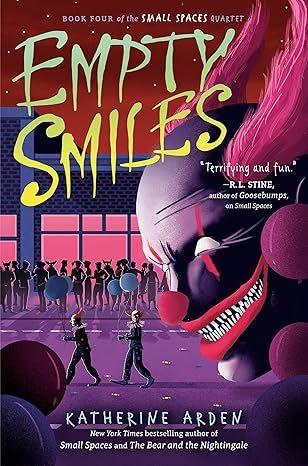
Empty Smiles (Small Spaces Quartet)
4.5
-
514
$8.81
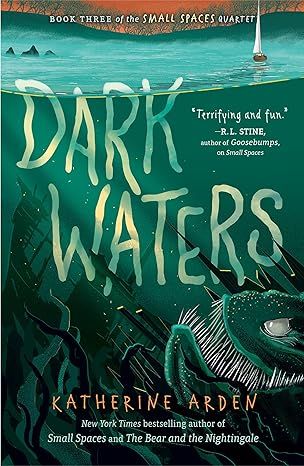
Dark Waters (Small Spaces Quartet)
4.5
-
702
$2.99
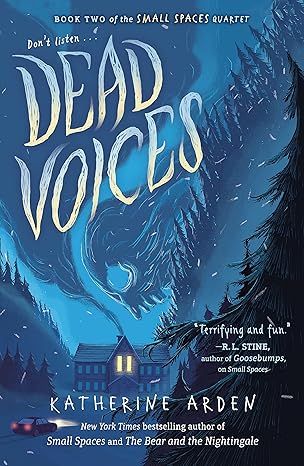
Dead Voices (Small Spaces Quartet)
4.6
-
1,279
$2.99

Small Spaces (Small Spaces Quartet)
4.6
-
2,480
$4.99
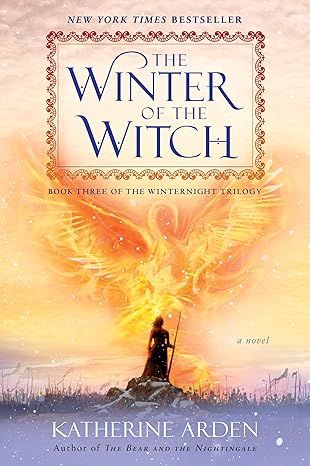
The Winter of The Witch
4.7
-
8,459
$12.95
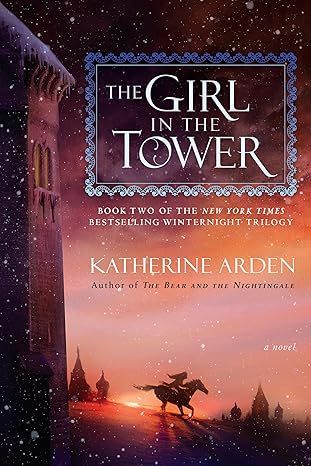
The Girl in the Tower: A Novel (Winternight Trilogy)
4.6
-
9,947
$12.99
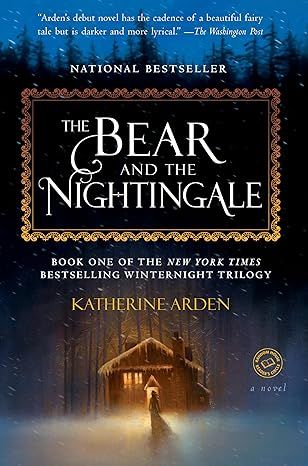
The Bear and the Nightingale: A Novel (Winternight Trilogy)
4.4
-
16,897
$10.39
Best Sellers
View all
The Tuscan Child
4.2
-
100,022
$8.39

The Thursday Murder Club: A Novel (A Thursday Murder Club Mystery)
4.3
-
155,575
$6.33

Sapiens: A Brief History of Humankind
4.6
-
140,302
$13.49

The Butterfly Garden (The Collector, 1)
4.3
-
88,556
$9.59

Things We Hide from the Light (Knockemout Series, 2)
4.4
-
94,890
$11.66

The Last Thing He Told Me: A Novel
4.3
-
154,085
$2.99

The Perfect Marriage: A Completely Gripping Psychological Suspense
4.3
-
143,196
$9.47

The Coworker
4.1
-
80,003
$13.48

First Lie Wins: A Novel (Random House Large Print)
4.3
-
54,062
$14.99

Mile High (Windy City Series Book 1)
4.4
-
59,745
$16.19

Layla
4.2
-
107,613
$8.99

The Locked Door
4.4
-
94,673
$8.53
